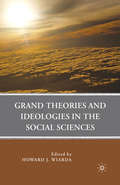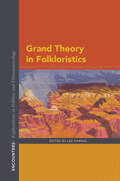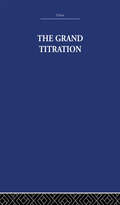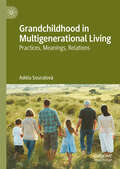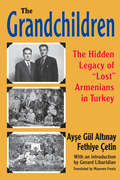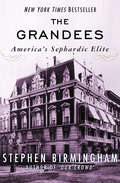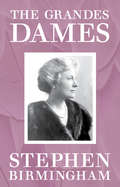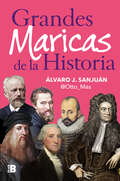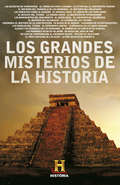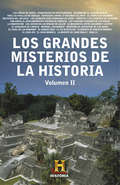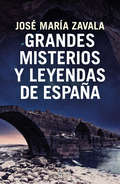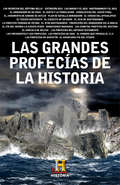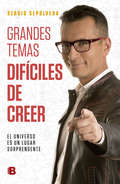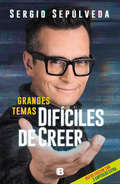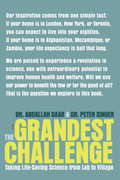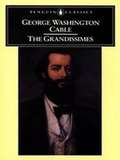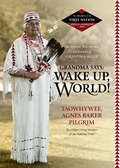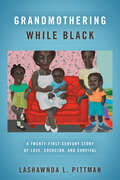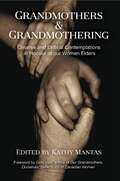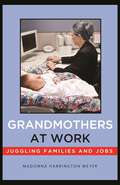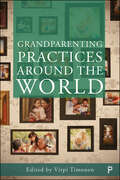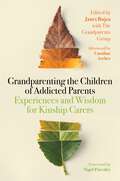- Table View
- List View
Grand Theories and Ideologies in the Social Sciences
by Howard J. WiardaThis book analyzes the main competing grand theories in the social sciences, including developmentalism, dependency analysis, Marxism, institutionalism, rational choice, Freudianism, environmentalism, sociobiology, neurosciences, and transitions to democracy.
Grand Theory in Folkloristics (Encounters: Explorations in Folklore and Ethnomusicology)
by Lee HaringEssays arguing diverse positions on the concept of a grand theory in American folklore.Why is there no “Grand Theory” in the study of folklore? Talcott Parsons (1902–1979) advocated “grand theory,” which put the analysis of social phenomena on a new track in the broadest possible terms. Not all sociologists or folklorists accept those broad terms; some still adhere to the empirical level. Through a forum sponsored by the American Folklore Society, the diverse answers to the question of such a theory arrived at substantial agreement: American folklorists have produced little “grand theory.” One speaker even found all the theory folklorists need in the history of philosophy. The two women in the forum (Noyes and Mills) spoke in defense of theory that is local, “apt,” suited to the audience, and “humble”; the men (Bauman and Fine) reached for something Parsons might have recognized. The essays in this collection, developed from the forum presentations, defend diverse positions, but they largely accept the longstanding concentration in American folkloristics on the quotidian and local.
The Grand Titration: Science and Society in East and West
by Joseph NeedhamFirst published in 1969.The historical civilization of China is, with the Indian and European-Semitic, one of the three greatest in the world, yet only relatively recently has any enquiry been begun into its achievements in science and technology. Between the first and fifteenth centuries the Chinese were generally far in advance of Europe and it was not until the scientific revolution of the Renaissance that Europe drew ahead. Throughout those fifteen centuries, and ever since, the West has been profoundly affected by the discoveries and invention emanating from China and East Asia. In this series of essays and lectures, Joseph Needham explores the mystery of China's early lead and Europe's later overtaking.
Grandchildhood in Multigenerational Living: Practices, Meanings, Relations
by Adéla SouralováGrandchildhood in Multigenerational Living: Practices, Meanings, Relations is the first book to sociologically analyse grandchild-grandparent relationships from the perspective of grandchildren. Expanding the knowledge about hitherto under-researched grandchildren, this book puts grandchildren’s perspectives in the centre of qualitative analysis focuses. Presenting grandchildhood in its complexity, the author addresses its multiple dimensions from 54 in-depth interviews with grandchildren living in three-generation households with their parents and grandparents. Drawing upon 'family practices', this book conceptionally develops ‘grandchild practices’ as a new approach to see the diversities and similarities, harmonies and tensions, joys and obligations, or, simply put, the daily ambivalences of family relationships. This unique book is an indispensable resource for researchers and students of family studies and sociology of generations who wish to investigate how grandchildren understand, negotiate and make sense of their relationships with grandparents.
The Grandchildren: The Hidden Legacy of 'Lost' Armenians in Turkey
by Ayse Gul AltinayThe Grandchildren is a collection of intimate, harrowing testimonies by grandchildren and great-grandchildren of Turkey's "forgotten Armenians"—the orphans adopted and Islamized by Muslims after the Armenian genocide. Through them we learn of the tortuous routes by which they came to terms with the painful stories of their grandparents and their own identity. The postscript offers a historical overview of the silence about Islamized Armenians in most histories of the genocide.When Fethiye cetin first published her groundbreaking memoir in Turkey, My Grandmother, she spoke of her grandmother's hidden Armenian identity. The book sparked a conversation among Turks about the fate of the Ottoman Armenians in Anatolia in 1915. This resulted in an explosion of debate on Islamized Armenians and their legacy in contemporary Muslim families.The Grandchildren (translated from Turkish) is a follow-up to My Grandmother, and is an important contribution to understanding survival during atrocity. As witnesses to a dark chapter of history, the grandchildren of these survivors cast new light on the workings of memory in coming to terms with difficult pasts.
The Grandees: America's Sephardic Elite
by Stephen BirminghamThe true story of the first Jewish immigrants to the New World, their private society and stunning success, and their lasting impact on contemporary America In 1654, twenty-three Jewish families arrived in New Amsterdam (now New York) aboard a French privateer. They were the Sephardim, members of a proud orthodox sect that had served as royal advisors and honored professionals under Moorish rule in Spain and Portugal but were then exiled from their homeland by intolerant monarchs. A small, closed, and intensely private community, the Sephardim soon established themselves as businessmen and financiers, earning great wealth. They became powerful forces in society, with some, like banker Haym Salomon, even providing financial support to George Washington's army during the American Revolution. Yet despite its major role in the birth and growth of America, this extraordinary group has remained virtually impenetrable and unknowable to outsiders. From author of "Our Crowd" Stephen Birmingham, The Grandees delves into the lives of the Sephardim and their historic accomplishments, illuminating the insulated world of these early Americans. Birmingham reveals how these families, with descendants including poet Emma Lazarus, Barnard College founder Annie Nathan Meyer, and Supreme Court Justice Benjamin N. Cardozo, influenced--and continue to influence--American society.
The Grandes Dames
by Stephen BirminghamThe Grandes Dames gives brief and lively portraits of eight American women who wielded their wealth and influence to reshape the nation in the period between the 1870s and the Second World War.
The Grandes Dames
by Stephen BirminghamThe acclaimed social historian provides an in-depth look at eight society women who shaped upper class culture from the Gilded Age to WWII. Astor. Rockefeller. McCormick. Belmont. Family names that still adorn buildings, streets, and charity foundations. While their men blazed across America with their oil, industry, and railways, the matriarchs founded art museums, opera houses, and symphonies that functioned almost as private clubs. Linked by money, marriage, privilege, and power, these women formed a grand American matriarchy—and they ruled American society with a style and impact that make today&’s socialites seem pale reflections of their forbears. Stephen Birmingham takes us into the drawing rooms of these powerful women, providing keen insights into an American society that no longer exists. Caroline Astor, who, when asked for her fare boarding a streetcar, responded, &“No thank you, I have my own favorite charities.&” Edith &“Effie&” Stern deciding that no existing school would do for her child, so she had a new one built. And the legendary Isabella Stewart Gardner replying to a contemporary who was overly taken with their Mayflower ancestors: &“Of course, immigration laws are much more strict nowadays.&” These women had looks, manner, and style, but more than that, they had presence—a sense that when one of them entered a room, something momentous was about to occur; Birmingham opens a window to the highest levels of American society with these profiles of American &“royalty.&”
Grandes maricas de la historia
by Álvaro J. Sanjuán (@Otto_Mas)Nunca es tarde, amigos, para sacar del armario a un Gran Marica de la Historia Machos, heterosexuales, viriles... ¿Solo ese tipo de hombres han hecho historia? ¿Alguien puede creérselo? Más allá de la historiografía tradicional, nos encontramos con grandes poetas, intelectuales o cientí ficos homosexuales cuyos deseos han sido borrados. Es momento de sacarlos del armario. Desde Alejandro Magno o Leonardo da Vinci hasta Isaac Newton o Miguel de Cervantes, este libro desvela, de una manera desenfadada y a través de una profunda investigación, los grandes personajes homosexuales que han cambiado -pese a los prejuicios y las dificultades de su época- la historia de la humanidad.
Los grandes misterios de la historia
by Canal Historia¿Existe la Atlántida? ¿Cómo se construyeron las pirámides de Egipto? ¿Dónde se encuentra el Santo Grial? ¿Por qué continúan produciéndose desapariciones en el Triángulo de las Bermudas? La historia está repleta de preguntas sin respuesta, inquietantes enigmas que han dejado perplejos a los investigadores más reputados, misteriosas leyendas que han perdurado a lo largo de los siglos e inexplicables sucesos que todavía hoy crean controversia en el ámbito científico. Pero por fin se descubre la verdad oculta detrás de esas incógnitas. Este libro analiza todas las versiones y todos los puntos de vista sobre los temas más controvertidos, hasta resolver qué hay de cierto y qué de legendario en ellos. Nunca hasta ahora se habían abordado las preguntas más famosas del pasado y el presenta de nuestra civilización con el rigor y la amenidad con que el equipo del prestigioso Canal Historia ha revisado estos treinta grandes misterios.Civilizaciones perdidas, tesoros ocultos, fenómenos inexplicables, personajes legendarios, leyendas nazis..., Los grandes misterios de la Historia es un libro apasionante y revelador, un estudio de referencia que ningún aficionado puede perderse. La crítica ha dicho...«Un ejercicio que busca la objetividad y ofrece una completa variedad de versiones sobre los enigmas, pensando tanto en profanos como en expertos.»Interviú
Los grandes misterios de la historia. Volumen II
by Canal HistoriaTras el éxito de Los grandes enigmas de la Historia, Canal Historia recopila nuevos enigmas en un volumen ameno y riguroso que hará las delicias de los aficionados a la divulgación histórica. ¿Fueron los vikingos los primeros en descubrir América?¿Cómo murió la rubia platino más sensual de la historia del cine?¿Cuál es el origen de la Inquisición?¿Qué causó la muerte de Houdini, el ilusionista más famoso de todos los tiempos?¿Quién trazó las líneas de Nazca y con qué propósito?¿Se encuentra enterrado en el-Amarna el tesoro olvidado de Akhenatón? La Historia está plagada de preguntas sin respuesta, de misterios sin resolver que han dejado perplejos a investigadores de todo el mundo y de sucesos inexplicables que aún hoy crean controversia. Tras la gran acogida que los lectores brindaron al primer volumen de Los grandes misterios dela Historia, con más de cien mil ejemplares vendidos, el canal temático más famoso a nivel mundial presenta veinticinco nuevos misterios que apasionarán a todos los aficionados. Con el rigor y la amenidad característicos de HISTORIA, líder de la divulgación histórica en televisión, el segundo volumen de Los grandes misterios de la Historia promete más profundidad, más análisis y más diversión que su antecesor.
Grandes misterios y leyendas de España
by José María ZavalaCon el rigor y la amenidad que caracterizan a José María Zavala, este libro responde las preguntas más famosas y controvertidas de la Historia de España. «En Grandes misterios y leyendas de España vibra de nuevo el historiador riguroso con alma de periodista.»Luis María Anson Tras escudriñar en archivos inexplorados, Zavala viaja por todas las épocas al rescate de episodios increíbles y arroja luz sobre asuntos como la identidad del «hombre de las mil caras», que se hacía pasar por primo del rey Alfonso XIII, los pormenores del círculo esotérico de Felipe II, el hombre que tenía rayos X en los ojos, el enigma de las apariciones de Garabandal, la maldición del teatro Eslava, el mismísimo conde Drácula español, la identidad del Leonardo da Vinci español, la autopsia del gran descubridor Cristóbal Colón o cómo murió en realidad el célebre torero Manolete.
Grandes profecías de la historia
by Canal de Canal de HistoriaSegún los mayas y otras culturas milenarias, el fin del mundo está muy cerca... Canal de Historia desvela, de forma amena y rigurosa, las profecías más famosas de la historia.Profecías religiosas, bíblicas, profanas, de iluminados anónimos o de ilustres personajes, Las grandes profecías de la Historia recoge en veinticinco capítulos, los principales y más famosos vaticinios de la historia de la humanidad. De los griegos a los egipcios, pasando por los cristianos y los mayas, todas las grandes civilizaciones se han preocupado por controlar su destino prediciendo el futuro y, en muchas ocasiones, han acertado. Canal de Historia acompaña al lector en un revelador recorrido por uno de los más oscuros e inexplorados caminos de la historia, para desvelar quién predijo los atentados del 11-S, cómo marcaban el destino de los mortales las pitonisas de Delfos o en qué momento llegará el Juicio Final para los cristianos.Leonardo Da Vinci, Nostradamus, Newton, Rasputín o Edgar Cayce, son algunos de los nombres propios que, junto con expertos anónimos de diferentes culturas y credos, han realizado sus propias predicciones a lo largo de los siglos. ¿Cuánto hay de invención y cuánto de realidad en cada una de ellas?, ¿cuáles tienen base científica?, ¿en qué casos se han cumplido? Con su habitual mezcla de entretenimiento y rigor, Canal de Historia responde a estas y otras preguntas en un libro que apasionará por igual a aficionados e inexpertos de la parte más esotérica de la historia.
Grandes temas difíciles de creer: El universo es un lugar sorprendente
by Sergio Sepulveda¿Qué tanto sabe la humanidad acerca de sí misma? ¿Hasta dónde el miedo, la superstición y la magia construyen la Historia? A continuación, descubrirás la verdad sobre grandes temas difíciles de creer. Fantasmas, astronautas, grandes amores, leyendas, crímenes, historias bíblicas, reliquias de la antigüedad y muchos de los grandes misterios que han dejado asombrada a la memoria colectiva, son el alimento de la magia. También, son la materia prima que construyen estas páginas. Grandes temas difíciles de creer es un libro que responderá muchas preguntas, pero al mismo tiempo te hará pensar que el universo está sembrado de duda.
Grandes temas difíciles de creer
by Sergio Sepulveda¿Qué tanto sabe la humanidad acerca de sí misma? ¿Hasta dónde la superstición, el miedo, la magia y lo incognoscible construyen la Historia? Sergio Sepúlveda nos presenta una serie de apasionantes investigaciones en las que lo increíble ha plasmado su huella. Por estas páginas desfilan casos tan insólitos como el éxodo de los israelitas a través del mar Rojo, la maldición del número 27 en el rock, enigmáticos fantasmas, la historia secreta de la Ouija, entre otros. Sin lugar a dudas, grandes misterios que han dejado asombrada a la memoria colectiva y para los cuales difícilmente hay sólo una explicación. Grandes temas difíciles de creer ofrece más preguntas que respuestas a la mente del lector, y lo más importante es que demuestra que la realidad entera está sembrada de oscuras incógnitas. Atreverse a leerlo es entrar en el terreno de lo extraño, de lo dudoso y de lo que es difícil de creer. ¡BIENVENIDO A UN UNIVERSO EXTRAORDINARIO!
The Grandest Challenge
by Abdallah Daar Peter SingerThe health-sciences equivalent of Thomas Friedman's bestseller The World is Flat, this inspiring and revelatory book by two of today's finest scientists shows how advances in global health will transform lives -- particularly in the developing world -- over the next decade.The Grandest Challenge begins with a simple premise: that every person's life is of equal value, regardless of where in the world he or she lives. It also begins with a simple, alarming fact: in this age of spectacular scientific advances, it is still those who live in the developed world -- in the West -- who benefit most from our enormous power to combat disease, and those in the developing world who are most likely to die for lack of basic, inexpensive care and nutrition.In this revelatory book, distinguished scientists Abdallah Daar and Peter Singer argue that the revolution in biotechnology can save millions of lives -- but only if we find a way to bring knowledge and treatments out of state-of-the-art labs and into the world's most remote villages. The doctors lead us on an eye-opening, globe-spanning tour, showing us in vivid detail how developing countries can and are breaking the cycle of dependence, exchanging knowledge, and creating solutions that work for their own people as well as the rest of us.From the Hardcover edition.
The Grandissimes
by George Washington Cable Michael KreylingSetting forth formidable arguments for racial equality, Cable's novel of feuding Creole families in early nineteenth-century New Orleans blends post-Civil War social dissent and Romanticism.
Grandma Says: The Wisdom, Wit, Advice, and Stories of “Grandma Aggie”
by Agnes Baker PilgrimAgnes Baker Pilgrim, known to most as Grandma Aggie, is in her nineties and is the oldest living member of the Takelma Tribe, one of the Confederated Tribes of Siletz.A descendant of both spiritual and political tribal leaders, Grandma Aggie travels tirelessly around the world to keep traditions alive, to help those in need, and to be a voice for the voiceless, helping everyone to remember to preserve our Earth for animals and each other in a spiritual environment.Considered an excellent speaker, she has mesmerized her audience wherever she appears, and now her wit, wisdom, memories, advice, stories and spirituality have been captured for all to hear.Honored as a “Living Cultural Legend” by the Oregon Council of the Arts, Grandma Aggie here speaks about her childhood memories, about her tribe and her life as a child growing up in an area that often didn’t allow Indians and dogs into many public places, as well as about such contemporary issues as bullying, teen suicide, drugs and alcohol, Pope Francis, President Obama, water conservation, climate change, and much more. This is an amazing recording of one of the oldest and most important voices of the First Nation and of the world. Her stories and advice will mesmerize and captivate you, as well as provide a blueprint for how all the inhabitants of the earth can live together in harmony, spirituality, and peace.
Grandma's Remedies: A Guide to Traditional Cures and Treatments from Mustard Poultices to Rosehip Syrup
by Cherry ChappellLong before modern medicines became so widely available, families treated everyday illnesses with home-made remedies. Reused and refined year after year, they were handed down through the generations then lovingly copied into personal 'receipt' books. Grandma's Remedies brings together a beguiling collection of them, gathered from dusty medicine chests found in attics, recalled from childhoods long past, or discovered in family archives and libraries. Many of them are surprisingly effective. Did you know, for example, that drinking two cups of strong black coffee will alleviate an asthma attack? Or that chewing toasted fennel seeds will help combat indigestion? Or that rosehip syrup is a terrific source of vitamin C? But Grandma's Remedies is more than a guide to these traditional treatments, it also paints a vivid portrait of the world of our grandparents and great-grandparents. It shows how inventive and resourceful they were with the materials near to hand, how they made the most of everything in the store-cupboard, from bread through to vinegar, and how it was the women of the household who, despite being barred from the medical profession, were relied on to safeguard family health. In these days of antibiotics and painkillers, it's easy to forget how people survived when all they had to rely on was a garden, a larder and a healthy dose of common sense.
Grandmothering While Black: A Twenty-First-Century Story of Love, Coercion, and Survival
by LaShawnDa L. PittmanIn Grandmothering While Black, sociologist LaShawnDa L. Pittman explores the complex lives of Black grandmothers raising their grandchildren in skipped-generation households (consisting only of grandparents and grandchildren). She prioritizes the voices of Black grandmothers through in-depth interviews and ethnographic research at various sites—doctor's visits, welfare offices, school and day care center appointments, caseworker meetings, and more. Through careful examination, she explores the various forces that compel, constrain, and support Black grandmothers' caregiving. Pittman showcases a fundamental change in the relationship between grandmother and grandchild as grandmothers confront the paradox of fulfilling the social and legal functions of motherhood without the legal rights of the role. Grandmothering While Black illuminates the strategies used by grandmothers to manage their legal marginalization vis-à-vis parents and the state across a range of caregiving arrangements. In doing so, it reveals the overwhelming and painful decisions Black grandmothers must make to ensure the safety and well-being of the next generation.
Grandmothers and Grandmothering: Creative and Critical Contemplations in Honour of our Women Elders
by Kathy MantasToday, more and more grandmothers around the world are taking on varied responsibilities and many roles, sometimes concurrently. Consequently, grandmothers continue to play, as in the past, an influential role not only in the lives of their grandchildren, but also in our communities and in society more broadly. Grandmothers and Grandmothering: Creative and Critical Contemplations in Honour of our Women Elders, as the title suggests, seeks to pay homage to our grandmothers and their contributions to society. As well, it aims to explore the textured and complex phenomena of grandmothering from a range of disciplines and cultural perspectives. Our hope is that this collection challenges preconceived notions of what it means to be a grandmother and provides insight into the multifaceted nature of grandmothering.
Grandmothers at Work: Juggling Families and Jobs
by Madonna Harrington MeyerA study of the lived experience of working grandmothers in early twenty-first–century America.Young working mothers are not the only ones who are struggling to balance family life and careers. Many middle-aged American women face this dilemma as they provide routine childcare for their grandchildren while pursuing careers and trying to make ends meet. Madonna Harrington Meyer’s Grandmothers at Work explores the lived experience of working grandmothers. While all of the grandmothers in the book are pleased to spend time with their grandchildren, many are readjusting work schedules, using vacation and sick leave time, gutting retirement accounts, and postponing retirement to care for grandchildren. Some simply want to do this; others do so because their adult children need assistance and may have less security and flexibility on the job than do their mothers. Most of the grandmothers expect to continue feeling the pinch of paid and unpaid work for many years before their retirement. Grandmothers at Work provides a unique perspective on a phenomenon faced by millions of women in America today.Winner of the 2014 Richard Kalish Innovative Publication Award presented by the Gerontological Society of America
Grandmothers of the Light: A Medicine Woman's Sourcebook
by Paula Gunn AllenAllen retells and interprets 21 stories from civilizations spanning North America, including Chippewa, Okonagon, Iroquois, and Lakota--stories that have, for centuries, guided female shamans toward an understanding of the sacred.
Grandparenting Practices Around the World: Reshaping family
by Virpi TimonenThis exciting collection presents an in-depth, up-to-date analysis of the unprecedented phenomenon of increasing numbers of grandparents worldwide, co-existing and interacting for longer periods of time with their grandchildren. The book contains analyses of topics that have so far received relatively little attention, such as transnational grandparenting and gender differences in grandparenting practices. It is the only collection that brings together theory-driven research on grandparenting from a wide variety of cultural and welfare state contexts - including chapters on Europe, North America, Africa, Asia and Australia - drawing broad lines of debate rather than focusing at a country level. Building on the success of ‘Contemporary grandparenting’, edited by Virpi Timonen and Sarah Arber, this book further deepens our understanding of how social structures continue to shape grandparenting across a wide range of cultural and economic contexts. The book is essential reading and reference for researchers, students and policy-makers who want to understand the growing influence of grandparents in ageing families and societies across the world.
